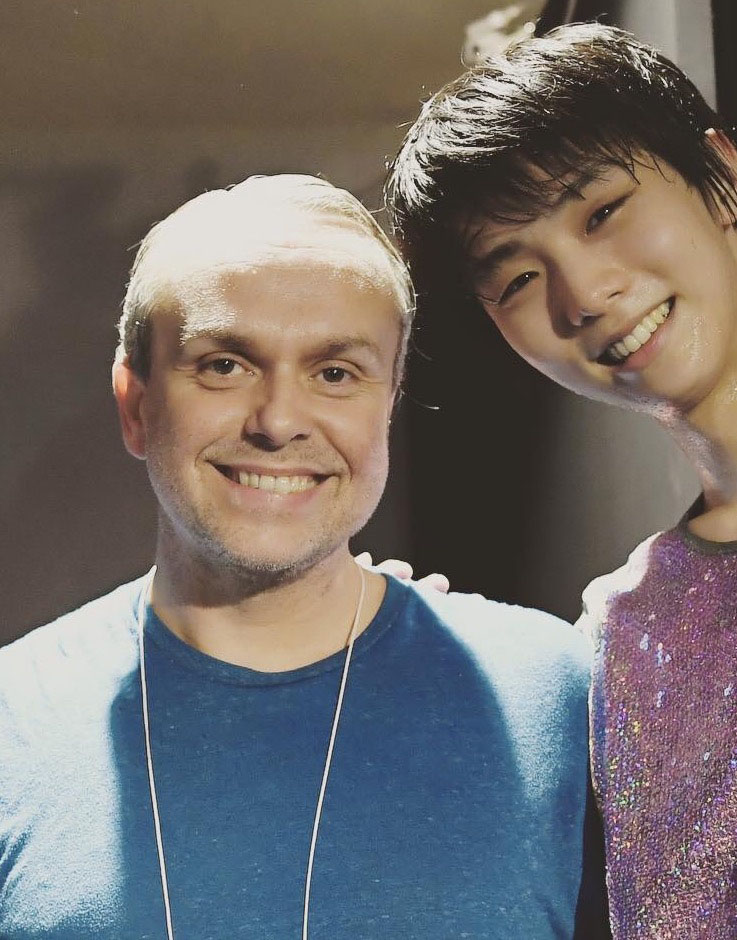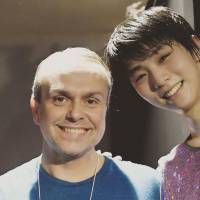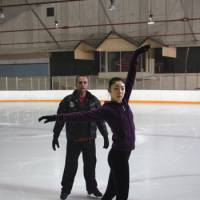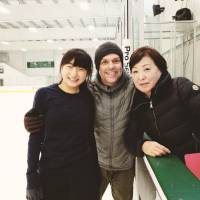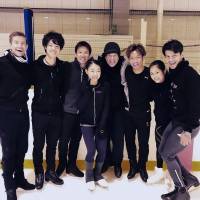Sometimes in life we encounter a person who is a veritable force of nature.
Dynamic, honest, emotional. The kind of individual that stops you in your tracks.
David Wilson is one of those people.
After a short time with Wilson you feel like you have known him forever. He possesses a charm that is disarming and the ability to laugh at himself.
Wilson is a visionary whose clients have enjoyed success at the highest levels. Genuine is the word that best describes him.
The Canadian sat down recently for an exclusive interview with Ice Time and talked about his work with Yuzuru Hanyu, his relationship with Yuna Kim, and how he became one of the best choreographers in the history of skating.
Wilson was in Japan earlier in the summer choreographing for Hanyu at "Fantasy on Ice" and creating short programs for Rika Kihira, Kaori Sakamoto and Mai Mihara. He has a long relationship with the country dating back to his work with Midori Ito in the 1990s.
The 52-year-old Wilson was born in Toronto and grew up in a small town to the north of it called Nobleton (Ontario). He began skating at a young age but was not able to excel competitively.
"I was a nobody. I wasn't even able to make it to the national level of competitive skating," Wilson recalled on a summer evening in Tokyo. "I never competed past novice. I didn't have the athletic component. I had a double axel but no triple jumps."
Though he may not have been a champion as a skater, Wilson became skilled enough to perform with the Ice Capades for five years touring North America and setting himself on the path to fame.
Wilson's idol growing up was 1976 Olympic and world champion John Curry, who nearly 25 years after his death remains an icon of the sport.
"I met him in New York once. It was at the Sky Rinks," Wilson remembered. "He used to give classes with the Ice Theater of New York. I was so star-struck I couldn't even say anything. He was kind of a big guy . . . and the British accent.
"I have a picture book of him that I used to look at and spend hours imitating his poses," Wilson continued. "I was a really reserved, shy, self-conscious person.
"John Curry appealed to me because he was beautiful. He had a beautiful aesthetic that I didn't think was possible. I had never seen that," Wilson commented. "John Curry was a revolution to me. He was like a male ballet dancer."
Ice Time asked Wilson what makes a great choreographer.
"I think there is more than one thing that makes a good choreographer," Wilson said. "As much as we need to be fabulously creative and musical and express ourselves with our body, we need to be good with people.
"Finding the right piece for the particular person at the right time is key, and really not easy to do. You can't hit it on the head every single time."
Wilson admitted that a choreographer doesn't always get it right.
"I've had my moments and I've had my disappointing moments, too," Wilson confessed. "That's life. There are really good choreographers that aren't good with people, but I don't know how long they last."
As with so many in life who end up pursuing a path that was not their original goal, choreographing for Wilson came about by osmosis.
"I basically started choreographing when I got off the road (1991) with the Ice Capades," Wilson stated. "I taught skating briefly, but I had always intended to go back to school.
"My intentions were not to teach skating. I had always had an eye on architecture or if that didn't work out, something in psychology. Those are my two areas of interest.
"I always just had this passion for structures and buildings and shapes. Furniture or anything with design."
Wilson then identified the catalyst for his interest.
"I read 'The Fountainhead' by Ayn Rand when I was in high school, and that was really what sparked me toward architecture," Wilson stated. "I always took visual arts through every grade, all the way up to grade 13 and I loved it. I had some ability in terms of drawing and that sort of thing. Not to be an outright artist, but I had a good eye."
Wilson cited his ability to interpret music as a prime reason for his later success.
"I was in the school band, so I did learn how to read and write music. I was also in the school choir," Wilson noted. "But I did not have a formal classical music training. I didn't have private lessons. I have an incredible ear, but I inherited it from my father who was self-taught.
"It's just something you are born with. It's the best weapon to have if you want to be artistic. I don't care how much of a show off you are, or how much personal charisma you have, if you're not in tune with the music it is not going to come across. You are going to look like an idiot."
Though he initially taught skating, Wilson knew quickly coaching wasn't the right vocation for him.
"Even though I would have never dreamt of this career, I feel thoroughly blessed. I realized early on how much I loved it," Wilson commented. "I loved teaching as well, but being asked to do choreography, for the first few years I did both. I was successful with it on a regional level and nationally in Canada with my first partner.
"I liked coaching too, but it's a different ballgame. Because of my personality, I'm more well-suited to being a choreographer. I'm more well-suited to being the crazy uncle than the father," Wilson added with a chuckle.
"With coaching, it's a struggle. You have to play bad cop with the kids, the skaters.
"Everything gets taken out on you," Wilson said. "The parents, you're the first line of complaint from them. Also, the association puts a lot of pressure on you.
"Coaches take the brunt, they really have to have broad shoulders. I'm a little too sensitive. Thank god I can choreograph. I don't think I would have lasted this long as a coach."
Orser one of a kind
Wilson has enjoyed a long association with coach Brian Orser, whom he works with at the Toronto Cricket, Skating and Curling Club. Wilson has collaborated with Orser for more than 10 years now and has witnessed up close what many in the sport believe is one of the greatest coaches ever.
Orser, a two-time Olympic silver medalist (1984, 1988) and world champion (1987), is the rare individual who was an incredible skater that has gone on to reach great heights as a coach.
Ice Time asked Wilson if Orser is a better coach than he was a skater.
"It would really be a close call. I've been around so many different coaches," Wilson stated. "There are not that many of us who do exclusively choreography. Those of us that do, end up being exposed to a lot of different coaches.
"I've seen a lot of different coaching, and he is just amazing. It's very unheard of for someone who really reached the pinnacle of success as a skater, and had the ultimate talent, to be then able to turn it around and have the ability to impart it and teach it.
"I've been watching him do it these past 10 years," Wilson continued. "I have also been watching him do it with lesser talented skaters, which people don't know. They see him on TV, and they see him with different jackets on representing different countries. They've seen him with Olympic champions."
Wilson said it is what the public doesn't see that has really impressed him about Orser.
"I've been watching Brian do it with more averagely talented skaters," Wilson commented. "You know, someone who has been working on their double axel for three years, but he doesn't give up. He's the pied piper.
"Brian was a great champion. He also had an amazing illustrious professional career. He did it all. He worked hard. He got the most out of his pro career. I think the most of any other skater that has ever had one.
"He and Kurt (Browning). Brian did the TV specials, he did the tours, he did ad campaigns. He has done seminars and speaking engagements. He's faced the sport from all angles."
Wilson believes that coaching with the kind of results that Orser has produced is something innate for his compatriot.
"I think the teaching gift is a separate gift that he was also born with," Wilson said. "I've seen other ex-champions try to teach and they are often lacking in patience, and lacking in the ability to really break it down.
"Most people of his caliber would have ended up doing mentoring, advising. But he likes to get right in there. He's like, 'I'm a doer.' He's Mr. Fixit. I wish I had been around a coach like him."
Yuna and the path to glory
Wilson is perhaps best known for his long association with Yuna Kim. The two forged a partnership that has endured through the years. "I just did 'All That Skate' again with Yuna in South Korea," Wilson said. "She came to work with me in Toronto for four days."
Wilson said Yuna's call came at the right time for him.
"I had just lost my dog (Hunter) March 11, and then they called me to do the show, and then two weeks later she decided to skate in it," Wilson stated. "I hadn't talked to Yuna in about 3½ years. So it was just heaven sent. It was such a pick-me-up in my life because I love this woman. I absolutely adore her.
"During the eight years I worked with her I had the kind of connection that is only going to happen a few times in your whole career," Wilson offered. "It was interesting to watch her. She went home with what I gave her. No jumps, she hasn't skated in four years, just a couple of spins, and she just wanted something that was pure and beautiful, not dramatic."
Wilson detailed how Yuna's approach to skating in the show had not changed from her days as a fierce competitor.
"People were sending me practice videos two or three times a week. I was sending notes back," Wilson noted. "She only had a couple of months to prepare. She tackled that experience like an Olympic champion.
"My point behind saying this is that all of these people are OCD (obsessive compulsive disorder). They all are. You can't be Olympic champion without being obsessive. You just can't. Show me one. I would love to meet them. It doesn't exist."
Wilson choreographed every short program and free skate for Yuna from the 2007-08 season until she retired after the 2014 Sochi Games. The results of their time together yielded an Olympic gold (2010) and silver (2014) as well as two senior world titles (2009, 2013).
Yuna's short program to a medley from James Bond movies in Vancouver remains one of the sport's iconic images.
New York Post columnist Mike Vaccaro wrote during the Vancouver Games that "watching Yuna Kim skate is like watching Michael Jordan play basketball."
Wilson detailed for Ice Time the story of how he came to be Yuna's choreographer.
"Yuna came to me at a time where I was a little bit disillusioned with my career," Wilson recalled. "I had a certain amount of success working with international clients. Some of it had gone well, some of it had been a little frustrating.
"I called Sebastian Britten, who was one of my first clients. A gorgeous skater. I built my whole career on the shoulders of the work I did with Sebastian. He was teaching at the time.
"I told him, 'There is this Korean girl, she wants to work with me. I don't know. I'm kind of sick of working with these international clients, because you never know if they are going to come back. You don't know what they are going to do with your work.'
"Sebastian was coaching at the time and had been out on the Junior Grand Prix circuit. He was like, 'David, you have to do it, because that girl is it. It starts and stops with her. She is everything.' "
Wilson talked about how he had earlier turned down the chance to work with Yuna.
"So I said yes. It turns out two years prior, when she was training up in Barrie (Ontario), they had already asked me but it was way late in the season. I didn't know who she was," Wilson stated. "So it didn't happen and she ended up working with Jeff Buttle, who was still competing then.
"When she came over, I had very low expectations. I called Jeff and asked him what it was like working with her and he said, 'She is not a very happy skater. She is not a very happy girl.'
"She was very stone-faced. Almost no emotion," Wilson commented. "She could not speak a word of English. So I had to figure out if I could connect."
Wilson then described how the synergy for Yuna's success came about.
"That first program was a long program (for the 2006-07 season). Brian and Tracy (Wilson) had just taken over temporarily at the Cricket Club. He told me, 'Any kids you have bring them to the Cricket Club. There is nobody on the ice. Private ice.'"
Wilson made it his mission to bring Yuna out of her shell.
"Basically I made it my own little obsession. If I can make this girl smile, if I can make her enjoy herself," Wilson said. "Slowly and surely I started to see her getting me.
"Then they came back and they asked Brian to coach her and it evolved into this. A year and a half later she got her braces off and she wasn't stone-faced anymore. Nothing will make a girl not smile more than having braces.
"She got her braces off and suddenly she was this gorgeous creature with her hair flowing and end of story," Wilson remarked. "We connected very early on.
"I remember at one point going to Brian and saying, 'This girl is fully lights on. Everything is on. She is actually one of us. She can't speak English yet, but she gets my humor and she feels everything I'm talking about. She gets every nuance of the music. It just doesn't show yet.' "
Wilson says that despite the incredible fame she has achieved, Yuna has remained grateful and open-minded.
"I've been teaching for 27 years, and I can't think of anyone — in spite of how great she is — being more thankful and open to whatever I have to contribute," Wilson noted. "Everything I have said to her she has taken to heart."
Yuna-Orser split painful
Wilson and Yuna's relationship was put to the test when she and Orser shockingly parted company just months after her victory at the 2010 Olympics.
Ice Time asked Wilson to provide his take on the row that put him in a very difficult situation.
"It was one of the hardest things I've ever gone through in my professional career. Very emotional," Wilson acknowledged. "It was very awkward for all of us."
Wilson says that Orser, in the midst of the crisis, would not let it affect his relationship with his compatriot.
"The testament to Brian is, how big can a person be that he has not allowed the fact that I continued on with Yuna . . . I really never had any part in the issue," Wilson stated. "I don't even know what exactly it was that went wrong between them. To this day I don't know.
"They know that I still have a very meaningful relationship with Brian. A very ongoing working relationship with Brian and a personal relationship with Brian. And Brian knows that I have maintained a fantastic relationship with Yuna," Wilson continued.
"I just feel really lucky that everyone was able to move on and do what they had to do. I managed to weather the storm. I was Switzerland," Wilson said with a laugh.
"Initially I tried to save it. I would go to one side and say, 'Can't we just sit down and talk as if we're family? Then I would go to the other side and say, 'Can't you just open up?'
"It was an acute, surprising, confusing situation. I didn't see it coming. I don't think Brian did," Wilson commented. "I spent the first few weeks thinking I could fix it. They would both politely tell me it was none of my business. So there wasn't much I could do."
Wilson was heartbroken to see Yuna depart from Toronto.
"I didn't want her to leave. It was beautiful what we had. Those four years at the Cricket Club were beautiful," Wilson stated. "It was tragic. It's still sad. It's a shame it had to end that way.
"I'm happy she has gone on to be happy and successful in her life and so has he. All these years past I think there is no ill will at all. Brian doesn't have any and I'm sure Yuna doesn't either."
Hanyu's incredible drive
Within a couple of years of Yuna's departure, Orser and Wilson had a new project in Hanyu.
Wilson has the highest praise for the two-time Olympic champion and told Ice Time a fantastic story about the Sendai native's desire to be the very best.
"He is a samurai warrior," Wilson says of the superstar. "He's like a mythical ninja warrior.
"For the Olympic year in Sochi, when it came down to musical choice, I had worked with him the year before and he had his heart set on 'Romeo and Juliet.' He sent me the most incredible email, and it was just this absolute declaration of how badly he wanted to win the Olympics.
"I had never encountered such pure, intense . . . It was beyond desire. Absolutely beyond. You could not put a higher imperative on it.
"He wrote, 'I don't want to wait until the next Olympics to be the Olympic champion, I want to be the Olympic champion now. And I'm willing to do anything to make that happen, so please, please help me.'
"It was like an imploration, and I thought 'Oh, my lord.' "
Wilson was effusive in his description of Hanyu and how he can fuse together his athleticism and artistry.
"I haven't worked with him since then (2013-14) in terms of his competitive stuff, but I have been watching him go," Wilson stated. "I have done exhibition pieces for him which I absolutely love. I get the best of both worlds.
"The thing with Yuzuru is, he is such a competitive animal and such a tiger. So when I get to do a show with him, I love it. As much as he is an amazing competitor and an athlete, he is also an amazing artist. He has charisma for 10 people.
"He can make the most pregnant pause nothing moment be so memorable, because he is feeling it. Then he can move his body like a cat. There is nothing he can't do."
Wilson discussed Hanyu's musicality and dedication to perfection.
"He has the ear . . . we did this piece ("Haru yo koi") for 'Fantasy on Ice.' I flew in one day early," Wilson commented. "We choreographed it in 4½ hours and I saw him for 1½ hours the next day for follow-up. Then I was into group rehearsals and that was it.
"He loved the song. It was a heartfelt kind of experience for him. He will spend hours in his hotel room going over each nuance of the music and each movement in the mirror with a fine-tooth comb."
Wilson confessed that even he was amazed about how quickly Hanyu was able to be presented with the program and then execute it flawlessly.
"I watched him perform it three times and I was just blown away. We choreographed it on Monday and he was performing it on Friday. I was sitting often watching the show beside (Evgeni) Plushenko's wife, and she just looked up in the air and was like, it's from somewhere else."
In all the years they have worked together, Wilson claimed he has never seen Hanyu lose his temper with another person.
"I've seen him get mad at himself, but I've never seen him get mad at somebody else," Wilson stated. "I have seen him get obsessed (with his skating)."
As with Yuna, Wilson says Hanyu has been generous with his gratitude.
"He has said some really heartfelt, sweet things to me of appreciation," Wilson said. "He's one of a kind, that's for sure."
Living and learning
Ice Time inquired about exactly how choreographers are compensated. Wilson said that even when he choreographs shows, it is the skaters who pay him for his work.
"Most of us charge a flat fee. As if you painted a painting," Wilson stated. "It depends on the level of skater you are working with, and whether it is a short program, long program, a show number.
"It depends if you are looking for a fast turnaround, or if you have a full week to work on it. It also depends on the level of the athlete you are working with too," Wilson added.
"You have your developing athletes, that most of us make a little bit of accommodation for. So the ones that are near the top or at the top, are fully subsidized (by federations). Mom and dad aren't paying any more."
Wilson acknowledged that the financial end of things is not his forte.
"It's been hard for me because I'm not good at dealing with those hardcore, tangible things," Wilson commented. "I'm an artist. I'm a people person. I'm a people pleaser, so I tend to be a little bit of a pushover.
"I don't necessary always holdout for myself. I've learned the hard way over the years to know how to take care of these sorts of things. I love giving advice to young choreographers."
Wilson found it tough going when he first began choreographing.
"Sandra Bezic has been an awesome mentor to me in more recent years, but when I was a young choreographer starting out, I had nobody to talk to," Wilson recalled. "I didn't know anybody.
"I have even thought in recent years of trying to create some kind of consortium — a place where choreographers could take care of choreographers and exchange ideas on choreography."
Wilson believes that choreographers are too often an afterthought.
"The associations don't take care of us. Coaches come first. We're taken for granted," Wilson said. "They are all guilty of it on the same level. We're tossed and slossed. We're in and out.
"When I was young there were a handful of choreographers you could name. Now within Canada alone, there has to be 15 of us that are getting international work," Wilson remarked.
"There are Russian choreographers, there are French choreographers, there are U.S. choreographers, there are Japanese choreographers and there might be a need for something that is specifically for us where we can join forces and have a stronger voice."
New challenge with Evgenia
Wilson said he was looking forward to working with two-time world champion and Pyeongchang silver medalist Evgenia Medvedeva, who joined Orser this summer in a very surprising move.
"She did Javi's show 'Revolution on Ice' a couple of years ago. She guest-starred and she was quite lovely," Wilson noted. "She was mature and delightful to work with.
"She puts it out there. She turns on the switch. She means business. I'm really excited to actually work with her for real. I think it will be great."
Wilson thinks having both Hanyu and Medvedeva practice together each day presents an ideal situation.
"Having Yuzuru and Javi for over four years, and getting through that so well with one having won and then the other having won," Wilson commented. "There were very few problems at all.
"Having a really top female and a top male skater is kind of perfect, because they are not competing against each other. They can just simply be inspiring to each other. And they both have a compatible work ethic.
"They are both tigers. So that's great. I think there is a mutual respect."
Fond memories of skaters
Wilson has worked with so many prominent skaters through the years that Ice Time asked him to offer a few words on several.
Javier Fernandez
"I think the thing about Javi that's kind of so different is that in the world of male figure skating, there are all these different types. Javi just comes along and he is like somehow everyman. He has this everyman thing.
"You can't spend more than five minutes with him and not be charmed by him. He's the sweetest guy ever. He can do total goofball comedy and then turn around and make you cry."
Midori Ito
"I was 13 years old and we went to watch the junior worlds in London, Ontario. Midori was 11 years old and it was a sight you will never see again.
“I will never forget how we felt sitting there watching her in practice. She looked like she was 5 years old. She looked like a toy on a track. Like a motorized toy was making her jump and land and keep going.
"This unending flow and power in her skating. Jumping with no hesitation and with such ease.
"Double axels, triple toes, triple sals, triple loops, triple flips even in practice.
“I choreographed for her when she was going to come back but didn’t. So people never saw what I did for her, but the honor I felt. I grew up in absolute awe of her.
"Fortunately we got along so great that when she decided to do the Prince Hotel ice shows, every years for six years I came back and did two new show numbers for her."
Miki Ando
"Such a sweetheart. I worked with her one year as an amateur. It broke my heart that it was only that one year. But she has come back to me since and we had some beautiful moments creating show numbers and really wonderful experiences.
"So talented, so beautiful, just a kind, gentle soul."
Daisuke Takahashi
"I've only ever had one opportunity to work with him. I did a short program for him and all he said was, 'I want something exotic.' We put together three pieces of music for the program. But he never came back for followup. I never got to see him again.
"There is a happy ending. He is coming to work with me again in two weeks in Toronto. I'm going to do a show number for him."
(Wilson created a new short program "The Sheltering Sky" for Takahashi, as days after Ice Time's interview with Wilson, the 2010 Olympic bronze medalist and world champion announced his return to competitive skating).
Yukari Nakano
"When I started with Midori, Yukari was about 9 years old. She reminded me of Tracy Wingman. She is one of my best friends. An absolute sensation as a young girl.
"Yukari at 9 had pizzazz and she skated like a big girl. She had the extension and the expression. She was amazing and such a sweet girl. She invented that donut spin."
Takahiko Kozuka
"Such a beautiful skater. So elegant and sophisticated."
Patrick Chan
"Patrick is the ultimate skater's skater. An absolute prince of a person. There is no one more appreciative, respectful.
"I thought I would never work with him. But I got the call and the past several years have been amazing."
Ice Time also wanted to know about skaters Wilson did not have a chance to work with but would have liked to.
Mao Asada
"It would have been wonderful, but it never happened. It was fate that I ended up working with Yuna."
Michelle Kwan
"I came close to working with her. Even just once would have been nice. She was an idol.
"She skated in our show in Korea a few years ago. I got to know her. You just fall in love with her. She is amazing.
"I did get to choreograph a duet for her and Yuna to 'When a Hero Comes Along' that they performed in both Korea and Los Angeles."



